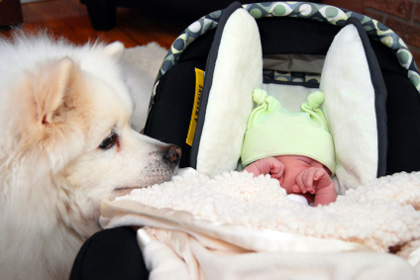If you just found out you’re pregnant, now is the time to start training your dog and incorporating new rules and a structured routine before your new baby arrives. Dogs function best when they have straightforward jobs. Introducing training exercises into your routine is to teach your dog their job for when the baby comes. When the baby arrives, life will change drastically for you and your dog, and we want to help prepare them in all ways possible. In the first section of Dogs to Diapers, I demonstrate new jobs for your dog around the house when the baby arrives. This gives the dog purpose in your new life with the babe.
After you bring your baby home, the dog is no longer your focus point. As your dog receives less of your attention, your dog could become less obedient around the house. Fewer rules mean less control of the dog as your baby ages, which could cause aggression or other behavior issues. Children can be the targets of this undesired behavior if it is not appropriately prevented. This is easily preventable by simply managing your home environment as you prepare for your new baby. Desensitize your dog to baby cries. Give the dog coping behaviors (otherwise known as basic obedience.) Section 2 of the film covers the steps to ensure your dog is mentally prepared for your infant.
Remember that dogs are creatures of habit, so setting up a routine sooner will make the adjustments more accessible for your dog. You want to start before your baby is here because you want your dog to associate the baby with only some of the changes. We want to decrease as much stress for the dog as possible by starting right when you find out your expectations.
Baby Noises
Baby noises can be scary and alarming for a dog. Even if your dog has interacted with children in the past, babies are still foreign to dogs. Baby sounds especially can be overwhelming to a dog without any experience with babies. Laughing, gurgling, and crying are all new sounds for a dog to experience. To help get your dog used to baby sounds, we recommend playing baby sounds before the arrival of the newborn. If your dog acts positively toward the baby’s noises, this can be a good sign that these noises will not disturb your dog when the baby comes home.
Baby Movements
If your dog has not been around a baby before, they will not initially be used to their movement. Even a baby crawl can be a strange move for a dog to understand. I don’t recommend having your baby crawl up to your dog. Crawling up to a dog’s face puts the baby at eye level, which dogs do not generally like. Babies tend to make sudden movements and high-pitched sounds that can be unnerving to a dog. The movement and sound may scare the dog, causing them to bite the infant out of fear.
New Baby Smell
A dog’s sense of smell is very keen, and we do not know how a dog will perceive new smells from the baby. Baby smells, such as baby lotion, powder, and soiled diapers, will be unique to your dog. I recommend that parents bring home a blanket or piece of clothing that smells like the baby before bringing home their newborn. This method is one of the most commonly recommended strategies, but it needs to be corrected. The intention is to help the dog get used to your baby’s smell before the first introduction. Unfortunately, this is not a suitable method because we need to know how your dog perceives the scent of the newborn. To increase the likelihood that your dog has a positive association with your baby, could you make sure that you pair the introduction with something the dog will have a positive association with?
Routine Adjustments
Dogs are creatures of habit and like having a routine. When a newborn baby arrives, the dog’s routine will change drastically. Section 3 of the film discusses practical ways to handle the dog in your new routine. This will affect eating and walking schedules. Sleep cycles are also affected when bringing home a newborn baby. These changes can be stressful for dogs, even with previous training and excellent manners. The difference in routine can cause dogs to misbehave and make them upset. Making gradual changes to the habit can help the dog become accustomed to a new schedule.
Families who don’t properly prepare their dogs for the arrival of a newborn often end up rehoming their dogs or isolating them from the family. Once the baby is here, families no longer find any time to train the dog. The good news is that Dogs to Diapers is here to guide you along this process so your dog is well-prepared for this new addition.



